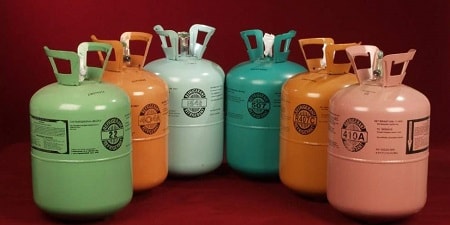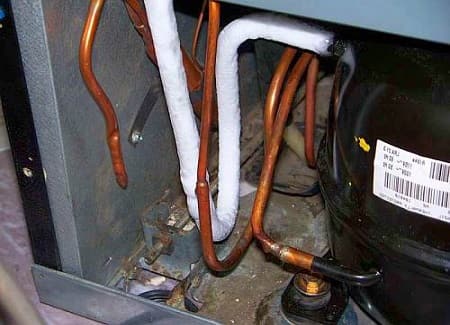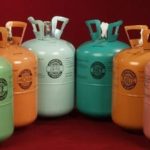Everyone in the house has a useful household appliance called a refrigerator, which keeps our products for a long time. Alas, like any device, it can break, but in this article we will talk about the leakage of the "refrigerant", the gas with which both chambers of the refrigerator are cooled, and we will figure out whether freon in the refrigerator is dangerous or not, and consider its harmfulness to humans ...
As mentioned above, breakdowns of the refrigerator may be accompanied by depressurization and gas leakage from the chamber. Therefore, do not in any way try to clean the ice from the walls of the unit with sharp objects, as this may end badly for you. Hence, people have the question "is freon dangerous from the refrigerator?"
Types of Freons

To date, freon of various brands is used in refrigeration systems, below we separately consider each of them:
- Brand R600a or "isobutane" - perhaps the most common type of refrigerant, widely used in refrigeration systems. It is a mixture of natural gases, so it does not destroy the atmospheric ozone layer. However, it has a fairly high degree of explosion hazard when it comes into contact with air. At high concentration in the room, the mixture may ignite. As for the danger to humans, it can only harm in high concentration - at the lower threshold of explosive danger, and this is 31 grams of substance per cubic meter of air. By standards, the most ordinary kitchen is 15 cubic meters, so to create such an environment you need 400 grams of this substance, but for this you will need a completely sealed room in which it can not escape anywhere. That and in the refrigerator itself isobutane no more than 150 grams.
- Brand R134a or "tetrafluoroethane" - also no less common type of freon, as well as the above refrigerant. It is the first drug bred without the use of Chlorine. It is a completely colorless gas. It differs from its predecessor in that it is non-toxic and non-explosive. Completely safe for humans in any environment and at any temperature.
- Brand R12 or "difluorodichloromethane" - mainly found in refrigerators of old production, so you will not find it in modern units. It is a colorless substance in the form of a gas, but it has a slight ether-like odor and is not explosive. It is harmful to the environment and is capable of depleting the atmospheric ozone layer. As for whether freon from a refrigerator of this brand is harmful, then everything is as follows - with a high concentration of a substance in industrial premises (the volume in the air is about 30%), it leads to human suffocation.However, there is not much of it in the refrigerator to create such an environment. If it is heated to a temperature of 330 degrees Celsius, then it will begin to emit toxic gases.
- Brand R22 or "difluorochloromethane" - just like the above type freon in the refrigerator, used in older models of refrigerators, today you will not find one. It is a gaseous substance, completely colorless, non-flammable and non-explosive. Has a subtle chlorine odor. The substance can easily destroy the ozone layer, but its potential is ten times less than that of the previous one. It can decompose into harmful elements in contact with flame. For a person, it becomes toxic only when it is heated to 250 degrees, when it begins to decompose into individual elements.
Despite the fact that freons in some cases are harmless or not at all hazardous to human life, it is best not to take risks and not come into contact with refrigerant substances.
How to find out which freon is circulating in your refrigerator
It is quite easy to find out what kind of freon you have in the refrigerator and its brand of your refrigerant in the refrigerator, for this you need to look at the compressor housing and find a special tag on which the brand of the used freon or any other substance will be indicated. If you do not want to move the refrigerator or it is not possible to get to the back wall, then you can find out the type of refrigerant in the technical documentation.
![]() See also - What is the freshness zone in the refrigerator?
See also - What is the freshness zone in the refrigerator?
What are the signs of a freon leak?

There are many leakage factors, some of which are caused by humans, while others are due to factory defects or inaccurate transportation of the device, well, or the refrigerator is simply outliving its life span. They are as follows:
- When you were removing the ice in the freezer with a sharp object, you accidentally punched the wall, after which you heard a hiss from this hole - here we are already talking about a direct leakage of freon.
- The compressor works, but it does not turn off, and in this case, insufficient cooling of the unit chambers is noticed - when freon leaks from the system, the refrigerator will not be able to maintain the set temperature, and it tries to compensate for this by continuous operation. If your refrigerator is two-chamber and has two compressors, then you can notice a drop in temperature only in one of the chambers, and if there is only one compressor, it will affect both chambers.
- The "motor" of the refrigerator does not want to start - if all refrigerant has disappeared from the system, the compressor will not start.
- The control panel indicates a malfunction - on modern models of refrigerators, information panels are provided that report a malfunction in the system by flashing certain indicators. Usually, the meaning of these indicators is described in the instruction manual of the device.
- You can also identify a leak visually - in this case, a small build-up of ice will form on the evaporator.
Most of the brands of freons have increased fluidity, so that with the slightest depressurization, the refrigerant can easily evaporate. Often it is very difficult to determine the place where the substance is transmitted because the gas is colorless, and because of the compressor you may not hear hissing. In these cases, there is little you can do yourself, here only masters with special equipment will come to your aid.
![]() See also - Refrigerator freezes food: why is this happening?
See also - Refrigerator freezes food: why is this happening?
Conclusion
For a refrigerator, freon is the most important element, without which it will not be able to function normally, therefore, as soon as you suspect its leakage from the system, contact a specialist as soon as possible.
We hope that we have answered your question: is freon in the refrigerator dangerous or not? As the manufacturers themselves indicate, it is harmless until it gets into a certain habitat, where it begins to decompose into toxic substances. Better not take risks, and if you leak, avoid breathing the vapor of this substance.
See also:
- 7 best Bosch refrigerators according to customer reviews
- 8 Best Samsung Refrigerators According to Buyers
- 9 Best Inexpensive Refrigerators According to Buyers
- 10 best LG refrigerators according to customer reviews

